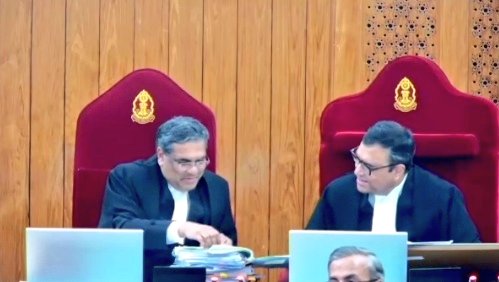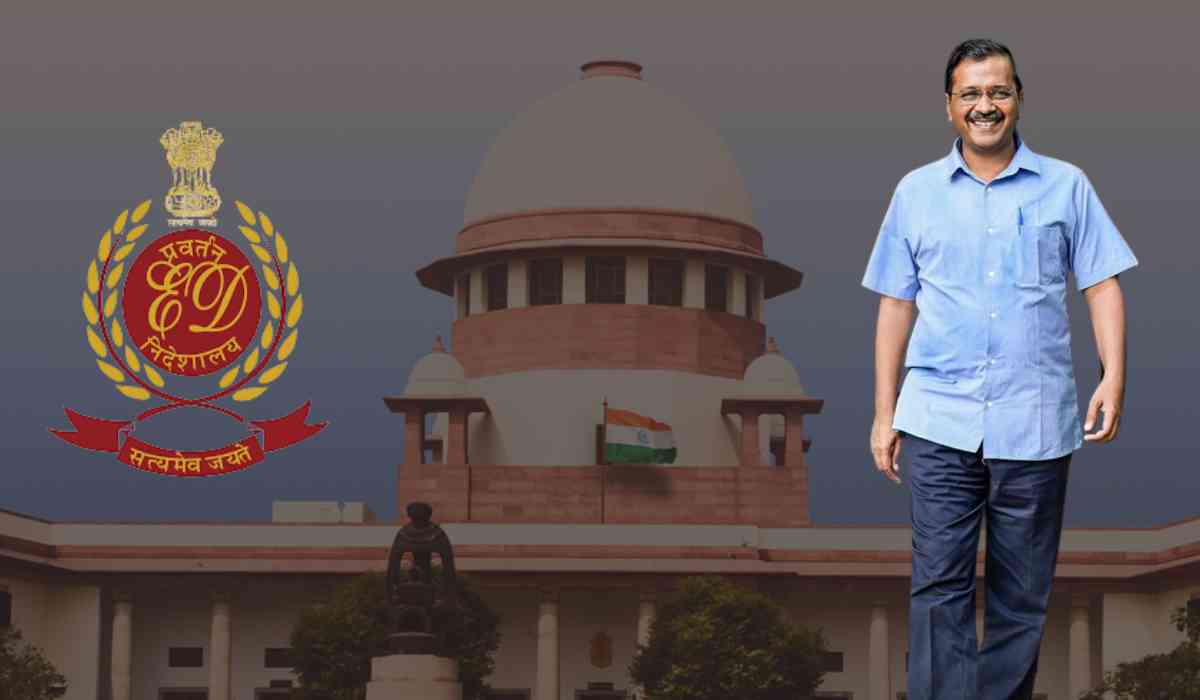A high-stakes legal battle unfolds in the Supreme Court as Delhi Chief Minister Arvind Kejriwal challenges his arrest by the Enforcement Directorate (ED) in connection with the alleged Delhi excise policy scam. Amidst intense legal arguments and counterarguments, the Bench of Justices Sanjiv Khanna and Dipankar Datta hears submissions from both sides, probing into the evidence and procedural aspects of the case.Here is a summary of the key points of discussion today.
Supreme Court of India has reserved its judgment on Arvind Kejriwal's petition challenging the validity of his arrest by the Enforcement Directorate
For all the updates on 16th May'24 hearing, read: Key Highlights Of Arvind Kejriwal Verdict
1. Judges' Observations:
- The Bench of Justices Sanjiv Khanna and Dipankar Datta reviewed the written records of the case and requested the ED submit a chart outlining new evidence emerging after the arrest of former Delhi Deputy CM Manish Sisodia.

- The court clarified that Kejriwal would have the liberty to apply for bail in the meantime.
SC: ARGUMENTS HEARD. JUDGMENT RESERVED. NOTWITHSTANDING THAT WE HAVE RESERVED JUDGMENT, ARVIND KEJRIWAL IF ADVISED MAY MOVE TRIAL COURT FOR GRANT OF BAIL IN ACCORDANCE WITH LAW.
- Justice Sanjiv Khanna emphasised that the investigating officer should arrest only if there is sufficient material to prove guilt, setting a threshold for arrests under Section 19 of the PMLA.
Justice Datta: so if we understand correctly then material should be reasonably suspicious.. so we should change the statute only? because statute only says reasons to believe.
ASG: degree of offence will change from stage to stage
Justice Datta: then statute would be as on material in his possession.. legislature is not assumed to waste words.. "material in his possession that a person is guilty of" why these words?
Singhvi continues reading witness statements to show that there is no role of kejriwal in the money laundering caseASG Raju interrupts SC: no Mr Raju no. let him argue
Singhvi: entire charge is 100 crores.. august 2023 charge this is .. this is old news.. march 2024 there was arrest... no money has been transferred.
SC: law requires to give grounds of arrest and not reason to believe
2. Senior Advocate AM Singhvi's Arguments:
- Singhvi argued that the material cited by the ED to defend Kejriwal's arrest was not present during his arrest, with all evidence predating July-August 2023.
every material in ground of arrest predates July, august 2023. this is striking on need to arrest, timing, reason to believe, everything. everybody ... all this evidence was in sisodia case.. so what was new in arvind kejriwal case.. evidence is all prior to august 2023.
- He objected to the ED's reliance on a witness statement regarding Kejriwal's stay in a seven-star hotel in Goa, questioning its absence on the "ground of arrest."
- Singhvi raised doubts about the alleged bribe money diversion for AAP's Goa election campaign, pointing out discrepancies in witness statements.
Singhvi: my friend has completely re-written section 19.. the threshold is so high in section 19 so that there is impossibility of bail.
SC: There is difference between ground of arrest and reason to believe.. now they are saying they have evidence regarding hawala transfer from AP to Goa.. now they say there is material in evidence..
Singhvi: there is not an iota of this material in grounds of arrest.
- He also objected to the ED's claims of finding chats between Kejriwal and hawala operators, accusing the agency of suppressing information.
3. ED's Defence:
- ASG SV Raju argued that the ED had evidence of kickbacks sent through hawala, distributed during the Goa election campaign.
SC: Mr Raju tell us which is the material after Manish Sisodia arrest...
ASG: We have given it all.. we have now discovered personal direct chats between Arvind Kejriwal and the hawala operators..
Singhvi: how can you argue all this now when the hearing is about to end.. are you suppressing evidence then?
SG: the hawala operators have been arrested now and it is recovered from them
- Raju contended that the court cannot assess evidence credibility at this stage, emphasising the limitations of the court's role in the framing of charges.
ASG: There is difference between criminal law and administrative law and at the stage of discharge the court cannot look at any other material apart from what the prosecution submits at all.
- He warned against entertaining pleas challenging arrests, suggesting it would burden the judiciary with numerous petitions and extensive document reviews by magistrates.
ASG: if this plea is entertained then it will open pandoras box. every other time someone will come up with a petition like this.magistrate is not required to read up thousands of papers and burn the midnight oil.
The proceedings highlight the legal complexities surrounding Kejriwal's arrest, with both sides presenting arguments regarding the sufficiency of evidence and procedural aspects of the case.
Inputs From Bar and Bench (X)
Media Inputs: X
ⒸCopyright 2024. All Rights Reserved Powered by Vygr Media.






















